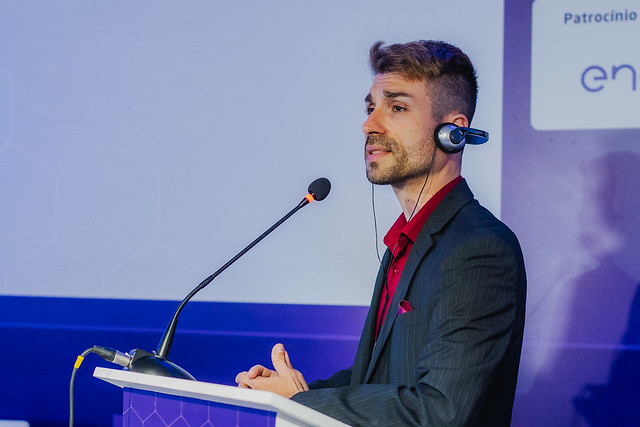
by Vera Queiroz.
Thiago Felipe S. Avanci holds a Ph.D. in Economic and Politic Law at the Universidade Presbiteriana Mackenzie. He holds a Post-Doctoral stage at the Mediterranea International Center for Human Rights Research, connected with Università Mediterranea di Reggio Calabria. He is a researcher at CEST and the leader of CNPq Research Group Fundamental Rights, Environment, Society and Technologies – Direitos Fundamentais, Ambiente, Sociedade e Tecnologias (DFAST) connected to the Universidade Católica de Santos (Brazil -2023-…). He is the author of several legal books.
Kaue Requejo and Beatriz Canaes asked the questions. The ESA Guarujá newsroom, in partnership with the CNPq DFAST Group and the UAI – Understanding Artificial Intelligence, had the initiative. Cest supported the event. The result is the following.
What are the most common cybercrimes among young people?
I think the first point that needs to be emphasized is that young people, and people in general (internet users), often lack awareness that certain practices are criminal. It can range from a simple offense, such as a silly insult, constituting a crime against honor, to more complex issues like incitement to suicide. It’s not just the haters who spread suicide encouragement, but we also see it in those chains, challenges, and creepypastas that circulate in games, forums, and so on. We realize that this can escalate to the point of self-harm or even incitement to suicide. So, crimes range from simple things like insults to something as complex as causing someone to lose their life.
Do you think there’s a need for more regulation, and if there are laws, are they sufficient?
This is a widely debated issue. We currently have a good number of laws. I’ll provide a brief overview to reach all those following, but it’s a complex issue. I believe that there are sufficient elements today to prosecute. Perhaps the prosecution could be improved, that can always be optimized. But there are enough elements for prosecution. Let me give you an example: we’re talking about crimes against honor. If I insult someone, it doesn’t matter if I’m insulting that person – you, right in front of me – or if I’m insulting someone on Facebook, Instagram, Twitter, or any other platform. The insult is the same, and the reach of that insult can be as extensive as in a physical meeting or in a social media community. In summary, regulation exists. Now, what we need to be aware of is mainly the new technologies and how these interactions will unfold. I’ll give you a final example: the metaverse issue. There’s talk and consideration of the possibility of virtual rape occurring in the metaverse. Rape is well-defined in the law under Article 213 of the Penal Code.
Can we apply the same classification of this crime – theoretically involving physical contact – to a virtual context?
We need to be careful. I’m not saying if it’s a crime or not; I’m leaving it to the reader to make their own judgment. But I’m saying that we need to be cautious because everything that is excessively regulated isn’t always the best path. So, we need to find a middle ground between excessive regulation, which hinders online activities from being as fluid as they normally are, and a lack of regulation, turning it into a free-for-all, and how this regulation can impact online security. Regarding cybercrimes, perhaps the lack of regulation isn’t exactly what would hinder the enforcement of criminal law. What might be lacking is a better apparatus, so it’s not precisely because of the existing classifications (we already have a good legal basis, a good legal framework, good codes and laws that may need some updating, but they already exist). Now, what might be lacking are the instruments for the State to act, for the delegate to act, for the police authority to act. They exist, that’s a fact, they already exist. But if we have difficulty in Brazil in dealing with physical crimes, we also have difficulty in dealing with virtual crimes to the same extent.
Where do messages that encourage criminal behavior on the internet, hate speech on social media, usually spread?
Let’s talk about this type of hateful conduct. Unfortunately, we live in the era of social media algorithms. I’m not just talking about instant messaging platforms like WhatsApp, for example, or Telegram. I’m talking about interactive social media like Instagram, Twitter (especially Twitter), Facebook… they tend to work based on algorithms, offering posts that generate what we can call a filter bubble effect. People who end up disseminating relatively similar messages because they are involved in this bubble. Resentment and hatred are maintained within this environment and eventually contaminate that group of people. Due to this algorithm, they end up gathering. This has a potentiated effect, and I think it’s a good explanation for some phenomena we’ve seen in the last 15 years, like political polarization, polarization of thoughts, and thought currents. We talk about fights between right and left, fights between flat-earthers, fights between creationists, and other communities that are usually so contained within a bubble but end up meeting and gaining strength and a loud voice because of these algorithms.
What are the fundamental challenges faced by authorities in identifying and punishing crimes committed through these platforms?
The first step is identification and going through the investigation process, as discussed earlier. As a user of the internet since 1996, I have witnessed the evolution of technology from the era of computers and dial-up internet. Back then, identification difficulties and lack of regulation were significant challenges for criminal investigation. Nowadays, we have efficient tools to identify machine IPs and track potential crimes, facilitating the investigation process. The availability of these tools makes the investigation process clearer and more efficient, especially in identifying the origin of criminal activities. However, it’s crucial to highlight that the lack of adequate equipment on the part of the police hinders the identification and punishment of people involved in online crimes. Without the necessary equipment, the police face significant challenges in tracing messages and criminal content. Therefore, the lack of adequate equipment underscores the importance of investing in resources to strengthen police investigative capabilities.
How can online privacy and data protection be compromised due to a lack of awareness of cybercrimes?
Privacy is directly linked to what we were discussing about IP, tracking, and network insertion. Currently, we have two relevant legislations: the Marco Civil da Internet and the Lei Geral de Proteção de Dados. The Marco Civil da Internet stipulates that devices connected to the internet have data and access records maintained by the provider, thus guaranteeing user privacy and rights. Through Marco Civil, user access is kept confidential, but information such as the volume of accessed data and who accessed it is recorded. In parallel, the Lei Geral de Proteção de Dados aims to protect individuals’ right to privacy, especially on sites that seek to personalize content based on identified preferences. Both legislations provide a solid foundation for data protection, but effectiveness depends on the control tools available to the police authorities. The challenge lies in balancing the need for investigation and punishment with the preservation of privacy and fundamental rights. Recent scandals involving privacy violations highlight the complexity of this balance. Current discussions address how far the State can go to investigate people without compromising their privacy. The conflict between individual protection and state action is a significant challenge for the future, especially given the increasing violations of accounts and virtual security issues. Addressing this new technological reality requires a careful approach, ensuring the State’s presence without being oppressive. The historical dilemma about the limits of State action resurfaces, and the State needs to be present without compromising individual freedom. This issue, debated over centuries, remains challenging, requiring balance to avoid excesses and ensure punishment for any abuses committed by the State.
What are the possible solutions and approaches to promote a culture of digital responsibility and combat criminal behavior on the internet?
More evidently, the ethical question comes into play. Why do we respect the law? Is it out of fear of punishment, or is there a moral and ethical foundation behind it? This question is crucial for society. Respect for the law is often associated with the certainty of punishment. For example, we don’t commit violent crimes because we know there can be legal consequences. The ethical challenge society faces is deeper awareness. Do we respect the law out of fear, or is there a more.
Click here to read the full interview with the public DA’s José Rubens Plates and Dr.Yuri Corrêa da Luz, and to watch the full interview recorded [content available in Portuguese only].
 English
English Português
Português
